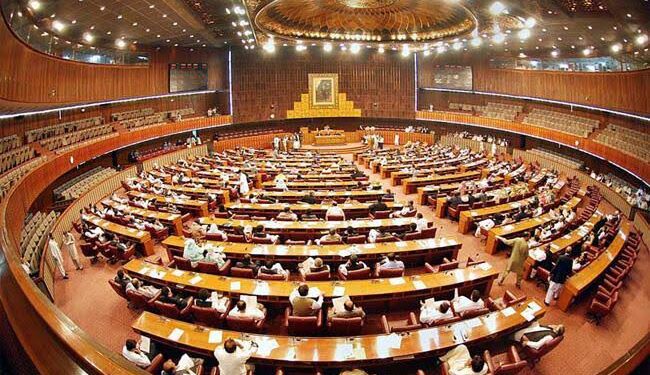Parliament of Pakistan has passed a resolution urging India to conduct a plebiscite in Jammu and Kashmir. The resolution, moved by Minister for Kashmir Affairs Amir Muqam, reaffirms Pakistan’s support for the Kashmiri people’s right to self-determination. It condemns India’s revocation of Article 370 and alleges human rights violations in the region.
Pakistan’s Stance on Kashmir
Muqam emphasized Pakistan’s unwavering moral, political, and diplomatic backing for the Kashmiri cause. He said the international community must address India’s actions in Jammu and Kashmir. The resolution highlights concerns over India’s policies and military presence in the region.
The document also accuses India of provocative rhetoric regarding Pakistan-occupied Kashmir and Gilgit-Baltistan. Pakistan maintains that Jammu and Kashmir remains a disputed territory under UN resolutions. Muqam urged the United Nations to fulfill its commitments on the Kashmir issue.
India’s Response
India firmly rejected the resolution and reiterated its stance on Jammu and Kashmir. The Ministry of External Affairs stated that the region was, is, and will always be an integral part of India. Officials dismissed Pakistan’s claims as interference in its internal affairs.
New Delhi has consistently rejected calls for international mediation on Kashmir. It insists that issues related to the region are a bilateral matter under the Simla Agreement of 1972. Indian authorities argue that Pakistan should address terrorism emanating from its territory instead of focusing on Kashmir.
Kashmir Dispute and Article 370
Tensions between the two nations escalated after India abrogated Article 370 on August 5, 2019. The decision revoked Jammu and Kashmir’s special status and split the region into two Union Territories. Pakistan strongly opposed the move, calling it a violation of UN resolutions and the rights of the Kashmiri people.
Since then, Pakistan has repeatedly raised the Kashmir issue at international forums. India maintains that the change in status was an internal decision aimed at promoting development in the region. Security measures and internet restrictions followed the revocation, sparking criticism from human rights organizations.
Regional and Global Reactions
Pakistan’s latest resolution is unlikely to alter India’s position but signals continued diplomatic pressure. Islamabad has sought support from allies, including China and Turkey, on the Kashmir issue. However, global powers like the United States and the European Union have urged both countries to engage in direct dialogue.
The United Nations has not taken any new steps regarding the Kashmir dispute. It maintains that its resolutions remain relevant, but no recent actions have been taken to enforce them. The UN Secretary-General has previously urged both nations to exercise restraint and resolve disputes peacefully.
Future of India-Pakistan Relations
The resolution adds another layer of complexity to India-Pakistan ties. Relations between the two nuclear-armed neighbors remain tense, with cross-border skirmishes and diplomatic standoffs continuing. India has accused Pakistan of harboring terrorist groups, while Pakistan blames India for unrest in Kashmir.
Despite repeated calls for dialogue, no formal talks have taken place between the two governments in recent years. With both sides holding firm positions, the Kashmir issue remains a major point of contention in South Asian geopolitics.
Related Stories:
At OIC Meeting Pakistan Calls For Resolution Of Kashmir & Palestinian Conflicts
Why Kashmir Day Matters? A Story of Ongoing Struggle and Identity
Azad Jammu Kashmir PM warns India to stop repression of political, human rights in IIOJK
















